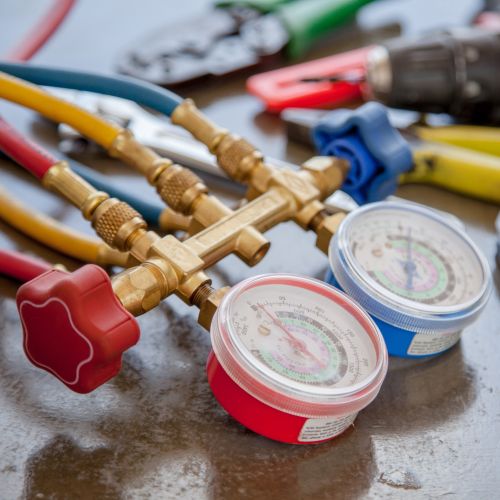Restoring Comfort with Delta Automotive Repair Center in Valley City
If your car's air conditioning system isn't keeping you cool in the scorching weather, there's no need to endure discomfort. Come over to Delta Automotive Repair Center in Valley City, where we'll swiftly restore your AC's performance. Reach out to us now at 330-483-3269 or drop by our shop at 6672 Center Road, Valley City, OH.

Five Indicators Your Car's AC Needs Attention
- Your car's AC blows air only slightly cooler than the outside temperature.
- Unpleasant mildew and mold odors emanate from your AC vents.
- The AC functions only while the vehicle is in motion.
- Even at the highest fan setting, there's weak airflow.
- Water condenses or drips onto your foot while driving.
Don't delay! If your car's AC isn't operating at peak efficiency, a visit to Delta Automotive Repair Center is a wise move. Routine maintenance now can help you avoid more costly auto AC repairs later. Sometimes, resolving a malfunctioning air conditioner is as simple and cost-effective as replenishing the coolant.
Ensuring Optimal Performance for Your Vehicle's Cooling System
Most car and truck air conditioning systems eventually require attention due to wear and tear. Hoses supplying the AC unit can crack, clog, or develop leaks if neglected. Let us service your car or truck to keep your cooling system operating at its best. Dial 330-483-3269 to learn more about how we can restore your air conditioning.
Common Automotive AC Repair Services
Recharging Your Car's AC
When your car's air conditioning (AC) loses cooling power or fails to deliver cool air, a freon recharge may be in order. Recharging your freon is often a fast and cost-effective repair that can help you beat the summer heat. However, a freon leak could be due to a cracked hose or seal, indicating a more substantial repair may be necessary.
Repair Your Car's AC Compressor
The cool air in your car primarily comes from the compressor. Your vehicle's compressor performs four essential functions: pressurizing the refrigerant to cool cabin air, regulating temperature output, sensing temperature changes inside and outside the vehicle, and directing air to your car's AC condenser.
Repair Your Car's AC Condenser
Typically located in front of the radiator, your vehicle's A/C condenser plays a crucial role. When your AC compressor pressurizes the refrigerant, it flows to the condenser, reducing temperature and pressure. The condenser is vital for maintaining a comfortable cabin temperature by transferring cooled liquid refrigerant to the receiver/dryer or accumulator.
Repair Your Car's AC Evaporator
The evaporator, a crucial component tucked just behind the dashboard, plays a vital role in your car's air conditioning system. By efficiently cooling and dehumidifying the air before it circulates throughout the vehicle's cabin, the evaporator ensures a comfortable and refreshing interior climate, especially during warmer seasons.
Replace Your Car's AC Thermal Expansion Valve or Orifice Tube
The Thermal Expansion Valve or Orifice Tube monitors A/C system pressure and temperature, determining the precise refrigerant amount that can safely enter the evaporator. Imbalanced pressure can lead to unwanted moisture buildup in your car or truck's AC system.
Freon Recharging FAQs
How often should Freon be changed?
Never, at least not in the way you think of your oil being changed. Your car's AC system is a sealed unit. No new Freon needs to be added unless there's a refrigerant leak. Over time as your vehicle ages small cracks may form in your AC system parts such as the compressor, condenser, evaporator, receiver-dryer, expansion tube and connecting hoses allowing Freon to escape. If this occurs, you need to replace the failing part and have your Freon recharged.
How long should a Freon recharge last?
If your car's AC system was recently repaired and required a Freon recharge it should not need to be replaced again. Your AC system is a closed or sealed system that does not allow Freon to escape. Freon is not like gasoline; it does not get depleted. If Freon is escaping after your car's AC system has been repaired, then additional work may need to be done to find the leak.
How many cans of Freon does a car take?
Don't guesstimate your car's refrigerant needs! Most use 28-32 ounces (2-3 12oz cans), but larger vehicles and rear A/C can be different. Check your manual for the exact amount to avoid overfilling.
Can I leave my car running when adding Freon?
It is advised to have your engine running while recharging your car's A/C system. This is essential as the A/C compressor, powered by the engine, must be active to facilitate proper refrigerant circulation and ensure an effective recharge.
Why is my car blowing hot air after adding Freon?
A refrigerant leak can lead to a loss of pressure in the AC system, resulting in a failure to produce cold air. This is frequently the primary reason a recharge may prove ineffective. It is crucial to inspect the system for leaks and address any issues before proceeding with a recharge.
Schedule your auto AC repair appointment with Delta Automotive Repair Center today! Our expert technicians are equipped to swiftly diagnose and resolve all your air conditioning issues.
To learn more about our AC repair services, call us at 330-483-3269 or request a quote by clicking below:
Request Quote
Discover More About AC Repair Services At Delta Automotive Repair Center in Valley City
Engine Heating & Cooling Services
Brake Repair
Car & Truck Care Services


